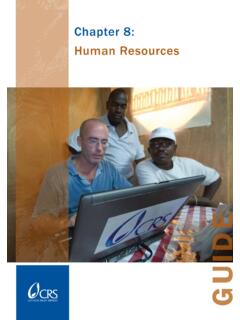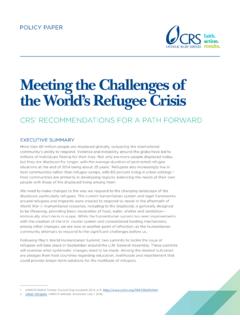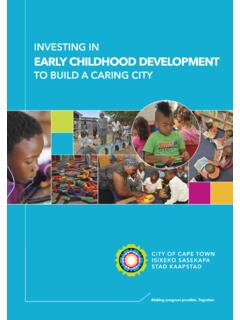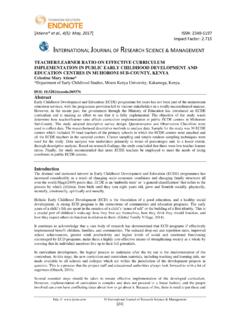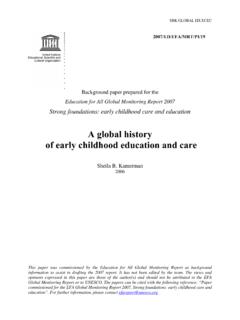Transcription of Early Childhood Development Curriculum
1 OVERVIEW FOR FACILITATORSPURPOSE The purpose of the six-part series of manuals is to strengthen the technical capacity of women religious and congregations in Kenya, Malawi, and Zambia that are involved in Early Childhood Development (ECD). The Curriculum was created within the CRS-led project called Strengthening the Capacity of Women Religious in Early Childhood Development , or SCORE-ECD, funded by the Conrad N. Hilton Foundation and led by Catholic Relief Services (CRS). CRS is a partner in the Hilton Foundation s strategy to improve the developmental outcomes of the youngest children affected by HIV/AIDS. This Curriculum is intended for use with children ages 0-5.
2 It is tailored to the needs of ECD service providers, especially congregations, and includes case studies based on sisters experiences. It serves SCORE ECD countries, Kenya, Malawi and Zambia as an ECD training resource. For example, the government of Malawi utilizes this Curriculum in its regional training of ECD workers and caregivers (See Foreword Letter).The Curriculum consists of six ECD resource guides for sisters and congregations, with corresponding guides for the facilitators who carry out the training. It also has a pre-posttest document for gauging the knowledge and skills of trainees before and after the sessions. The six manuals cover: Approaches to Early Childhood Development Early Childhood Development Assessing Young Children Quality Early Childhood Environments for Young Children Children with Special Needs and Child Protection Health, Safety, and Childhood Development Curriculum : 2 Early Childhood Development CURRICULUMGOALSThe goals of the Curriculum are to ensure that young children: Have high-quality, consistent, and safe relationships with their caregivers.
3 Are treated holistically by their caregivers, with attention to their health, nutrition, safety and protection, as well as all areas of their Development : spiritual-moral, physical-motor, cognitive-language, and social-emotional. Are protected from psychological and physical harm, and that their rights to survival, growth, and participation are fully met, with special attention to children with special needs such as orphans and vulnerable children (OVC) and children with disabilities. Are cared for in a culturally appropriate manner, with respect for their values, beliefs, experiences, and language, as well as those of their caregivers, families, and communities.
4 Grow up and learn in a safe, healthy, nutritious, inclusive, and stimulating environment, with sufficient opportunities for play, creativity, exploration, physical movement and sensory manipulation of objects, and social and individual activities for indoor and outdoor play. Receive care from responsive and sensitive caregivers and teachers who manage their behavior in a loving way rather than through harsh punishment. Are regularly observed so that their progress can be documented and they receive a timely and appropriate interventions. TOPICS The guides cover the following topics:Resource Guide 1: Approaches to Early Childhood Programs Session1: Standards for Quality Early Childhood Programs Session 2: Understanding Young Children Session 3: Supporting Child Development through Holistic Approach and PlayResource Guide 2: Introduction to Early Childhood Development Session 1: Early Childhood DevelopmentSession 2: Development and Intervention of Infants and Toddlers Session 3: Development and Intervention of Preschool-age Children Resource Guide 3: Assessment of Young Children s DevelopmentSession Topic.
5 Using Observation and Documentation for Ongoing Assessment of Young Children Resource Guide 4: Quality Early Childhood Environment for Young ChildrenSession 1: The Physical EnvironmentSession 2: Group Activities in Early Childhood EnvironmentsSession 3: Program Planning in Early Childhood EnvironmentsSession 4: Supporting Young Children in Language and Literacy Session 5: Supporting Young Children in Early MathematicsSession 6: Administration of Early Childhood ProgramsEARLY Childhood Development Curriculum 3 Resource Guide 5: Young Children with Special Needs and ProtectionSession 1: Young Children and Disabilities Session 2: Vulnerable Children: Young Children Living with and Affected by HIV and AIDS Session 3: Child Protection Resource Guide 6: Health, Safety, and NutritionSession 1: Health and Safety of Young Children Session 2: Growth and Nutrition of Young ChildrenDOCUMENTS NEEDED DURING THE TRAINING Trainees and facilitators must have a copy of the ECD Resource Guides.
6 Facilitators must have a copy of the facilitator s guides (Note: If the training is for master trainers, each one of the master trainers/trainees will receive the facilitator s guide upon completing the training). Facilitators need to have the following resources for the training: Pre-posttest questionnaire to be administered before the training begins and after the training is completed (The organizer of the training must prepare copies of these materials). National ECD Policy documents of trainees country for Resource Guides 1 & 4 (For example, for SCORE project trainees, national policy documents of Malawi, Kenya, and Zambia are used). Care for Child Development (2012) by UNICEF-WHO Resource link: Play for Growing Smart Children: Things You Can Do and Toys You Can Make Manual Resource Link: Copies of CRS Lesotho Whose Child Is This?
7 Positive Parenting Counselling Flip Book (Note: The organizer of the training needs to make copies of these tools) UNICEF s Integrated Management of Childhood Illness: Caring for the child s healthy growth and Development A training course for community health workers (2012). (The organizer of the training must prepare copies of these materials).4 Early Childhood Development CURRICULUMSUMMARY OF TRAINING ACTIVITIES IN THE FACILITATOR S GUIDEFACILITATOR S GUIDE TOPICSESSION TOPICSUGGESTED LENGTH OF SESSIONSUGGESTED TRAINING DAYA dult LearningHow to Work with Groups2 hoursDay 1 Pre-posttestIntroduction and Pre-test1 hour & 30 MinutesDay 1 Resource Guide 1.
8 Approaches to Early Childhood DevelopmentSession 1. Standards for Quality Early Childhood ProgramsClosure: Session and Training Evaluation5 hours & 15 MinutesDay 1 Session 2. Understanding Young ChildrenClosure: Session and Training Evaluation3 Hours & 30 MinutesDay 2 Session 3. Supporting Child Development through Holistic Approach and PlayClosure: Session and Training Evaluation4 Hours Resource Guide 2. Introduction to Early Childhood DevelopmentSession 1: Early Childhood DevelopmentClosure: Session and Training Evaluation3 hours & 45 minutesDay 3 Session 2: Development and Intervention of Infants and ToddlersClosure: Session and Training Evaluation6 hours Day 4 Session 3: Development and Intervention of Preschool-age Children Closure: Session and Training Evaluation4 hours & 30 minutesResource Guide 3.
9 Assessment of Young Children s Development Session 1. Using Observation and Documentation for Ongoing Assessment of Young ChildrenClosure: Session and Training Evaluation6 hours & 15 minutesDay 5 Resource Guide 4. Quality Early Childhood Environment for Young ChildrenSession Physical EnvironmentClosure: Session and Training Evaluation6 hours & 15 minutesDay 6 Session 2. Group Activities in Early Childhood Environment3 hours & 45 minutesDay 7 Session 3. Program Planning in Early Childhood EnvironmentClosure: Session and Training Evaluation3 hours & 30 minutesSession 4. Supporting Young Children in Language and Literacy Closure: Session and Training Evaluation6 hours & 15 minutesDay 8 Session 5.
10 Supporting Young Children in Early MathematicsClosure: Session and Training Evaluation6 hours & 30 minutesDay 9 Session 6. Administration of Early Childhood ProgramClosure: Session and Training Evaluation2 hours & 30 minutesResource Guide 5. Young Children with Special Needs and ProtectionSession 1. Young Children and DisabilityClosure: Session and Training Evaluation5 hours & 15 minutesDay 10 Session 2. Vulnerable Children: Young Children Living With and Affected by HIV and AIDS Closure: Session and Training Evaluation3 hours & 45 minutesDay 11 Session 3. Rights and Protection of Young Children3 hours & 45 minutesResource Guide 6. Health, Safety and NutritionSession 1.




